Related Research Articles

Sheikh Mujibur Rahman, popularly known by the honorific prefix Bangabandhu was a Bengali politician, revolutionary, statesman, activist and diarist, who served as the President of Bangladesh from April 1971 to January 1972 and again from January 1975 till his assassination in August 1975, and Prime Minister from January 1972 to January 1975. Mujib successfully led the Bangladeshi independence movement and restored the Bengali sovereignty after over two centuries following the Battle of Plassey in 1757, for which he is honoured as the 'Father of the Nation' in Bangladesh. In 2011, the fifteenth constitutional amendment in Bangladesh referred to Sheikh Mujib as the Father of the Nation who declared independence; these references were enshrined in the fifth, sixth, and seventh schedules of the constitution. His Bengali nationalist ideology, socio-political theories, and political doctrines are sometimes called Mujibism.

The Bangladesh Liberation War was a revolution and armed conflict sparked by the rise of the Bengali nationalist and self-determination movement in East Pakistan, which resulted in the independence of Bangladesh. The war began when the Pakistani military junta based in West Pakistan—under the orders of Yahya Khan—launched Operation Searchlight against the people of East Pakistan on the night of 25 March 1971, initiating the Bangladesh genocide.
Raja Tridiv Roy sometimes spelled Tridev Roy, was a Pakistani politician, diplomat and writer who was the Minister of the Minority Affairs in Zulfikar Ali Bhutto cabinet. He was also the 50th Raja/King of the Chakma tribe in the Chittagong Hill Tracts region of present-day Bangladesh from 2 May 1953, until his abdication in 1971 following the Bangladesh Liberation War. He chose to remain a Pakistani when Bangladesh achieved independence in 1971. He became known as a writer, diplomat, Buddhist religious leader and politician in Pakistan.
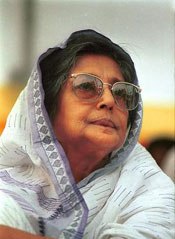
Jahanara Imam was a Bangladeshi writer and political activist. She is known for her efforts to bring those accused of committing war crimes in the Bangladesh Liberation War to trial. She has been called "Shaheed Janani".
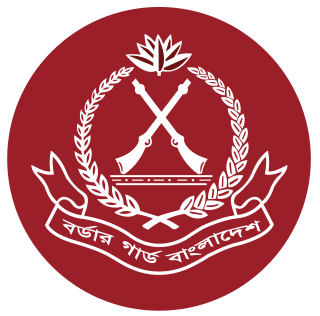
The Border Guard Bangladesh (BGB) is a paramilitary force responsible for the border security of Bangladesh. The BGB is entrusted with the responsibility to defend the 4,427 kilometres (2,751 mi) border of Bangladesh with India and Myanmar. It was formerly known as the Bangladesh Rifles (BDR).
Archer Kent Blood was an American career diplomat and academic. He served as the last American Consul General to Dhaka, Bangladesh. He is famous for sending the strongly worded "Blood Telegram" protesting against the atrocities committed in the Bangladesh Liberation War. He also served in Greece, Algeria, Germany, Afghanistan and ended his career as charge d'affaires of the U.S. Embassy in New Delhi, India, retiring in 1982.

Abul Fateh was a Bangladeshi diplomat, statesman and Sufi who was one of the founding fathers of South Asian diplomacy after the Second World War, having been the founder and inaugural Director of Pakistan's Foreign Service Academy and subsequently becoming Bangladesh's first Foreign Secretary when it gained its independence in 1971. He was Bangladesh's senior-most diplomat both during the 'Liberation War' period of its Mujibnagar administration as well as in peacetime.
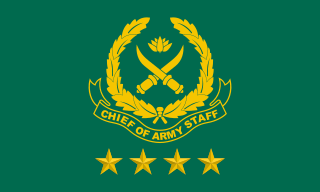
Chief of Army Staff (CAS) of Bangladesh Army, also known as Army Chief, is the highest-ranking officer of the Bangladesh Army. The Chief of Army staff has been a four-star rank since 2007. Maj. Gen. M. A. Rab was the Chief of Staff Army under the combined command of Bangladesh Forces which served as the origins of Bangladesh Armed Forces. After the War of Independence Bangladesh Army was officially reverted to the Ministry of Defense in 1972 and Maj. Gen. K. M. Shafiullah was appointed the Chief of Army Staff. The current Chief of Army Staff is Gen SM Shafiuddin Ahmed
Kazi Mohammed Shafiullah Bir Uttam, also known as K. M. Shafiullah, is a retired Bangladeshi general, former Chief of Army Staff of the Bangladesh Army, and former member of parliament.
Mohammad Hossain Ali was a Bangladeshi diplomat and former ambassador to the United States.
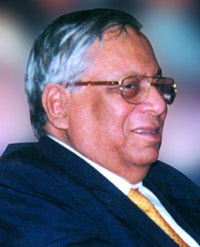
Humayun Rasheed Choudhury was a Bangladeshi career diplomat and Speaker of the Bangladesh National Parliament from 1996 to 2001. He was elected president of the 41st session of the UN General Assembly in 1986. He was awarded Independence Day Award in 2018 posthumously by the Government of Bangladesh.
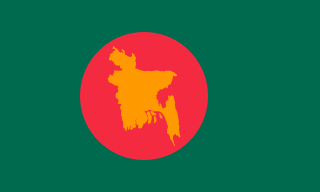
The Independence Day of Bangladesh is celebrated on 26 March as a national holiday in Bangladesh. It commemorates the country's declaration of independence from Pakistan in the early hours of 25 March 1971.
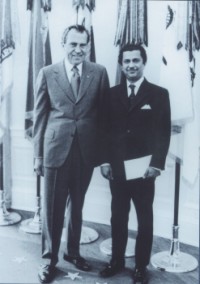
Enayet Karim was a Bangladeshi diplomat. He was the first ambassador from Bangladesh to United States. He later served as the Foreign Secretary.

Bangladesh–Russia relations are the foreign relations between Bangladesh and Russia. Russia has an embassy in Dhaka and a consulate-general in Chittagong, while Bangladesh has an embassy in Moscow. Diplomatic relations between the USSR and Bangladesh were established on January 25, 1972. These relations have continued with Russia being the successor state to the Soviet Union.
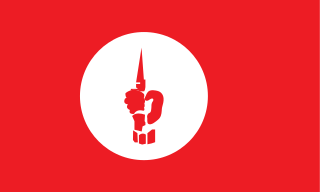
The Mukti Bahini, also known as the Bangladesh Forces, was the guerrilla resistance movement consisting of the Bangladeshi military, paramilitary and civilians during the Bangladesh Liberation War that transformed East Pakistan into Bangladesh in 1971. They were initially called the Mukti Fauj.
Tabarak Husain was a former Bangladeshi career diplomat. He was foreign secretary of Bangladesh from 1975 to 1978. He also held the position of chairman of Sadharan Bima Corporation and Grameen Bank.
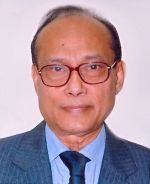
Nurul Islam Anu (Bengali: নূরুল ইসলাম অনু; 1939–2017), also known as A M Nurul Islam (Anu), was a Bangladeshi politician and bureaucrat. He started his career in the erstwhile Civil Services of Pakistan (C.S.P.) in 1963 and joined the Government of Bangladesh after independence in 1971. He was the private secretary to the former Prime Minister of Bangladesh Sheikh Mujibur Rahman (1972 to 1973). He was the longest-serving president of the U.S. chapter of Bangladesh Awami League (1989-2002).
Mohiuddin Ahmed was a Bangladeshi diplomat, the first in Europe to join the Bangladesh Liberation War while he was a second secretary at the High Commission of Pakistan in London. During his career, he served in different positions at Bangladesh Missions in Delhi, Geneva, Jakarta, Jeddah, and New York, and as a Secretary in the Ministry of Foreign Affairs and Principal, Foreign Service Academy. In 1997, he declined two years' ante-dated seniority given to freedom fighter officers. He was also a columnist and has written about 1500 columns in mainstream dailies and weeklies in Bangladesh.
Tufail Karim Haider, also known as Tufail K. Haider, is a diplomat and former High Commissioner of Bangladesh to India.
Khan Shamsur Rahman, also known as Khan Mohammad Shamsur Rahman, was a Bangladeshi diplomat and the first ambassador of Bangladesh to the Soviet Union. He was the High Commissioner of Bangladesh to India.
References
- ↑ "K M Shehabuddin - in whom patriotism was all". The Daily Observer. Retrieved 26 August 2017.
- ↑ "Hasina condoles Shehabuddin's death". The Financial Express. Archived from the original on 26 August 2017. Retrieved 26 August 2017.
- ↑ "President mourns death of Shehabuddin". Bangladesh Sangbad Sangstha. Archived from the original on 2017-08-26. Retrieved 26 August 2017.
- 1 2 3 "Former Bangladesh diplomat KM Shehabuddin who left Pakistan's side in 1971 dies". bdnews24.com. Retrieved 26 August 2017.
- ↑ "Former ambassador KM Shehabuddin passes away". Dhaka Tribune. Retrieved 26 August 2017.
- ↑ "There and Back Again - A Diplomat's Tale". UPL. Retrieved 10 August 2018.
- ↑ "Ambassador K M Shehabuddin: An intrepid patriot". The Daily Star. 12 April 2016. Retrieved 26 August 2017.